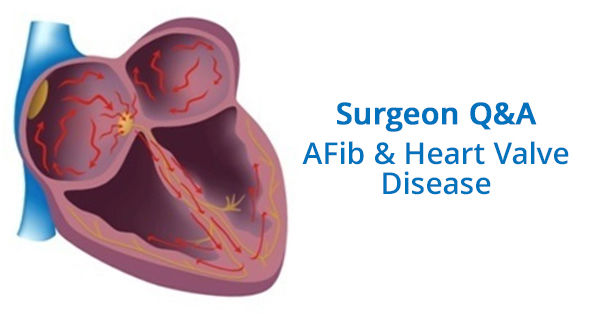Surgeon Q&A: What Should Heart Valve Patients Know About Atrial Fibrillation?
By Adam Pick on July 25, 2018
Now, more than ever, I am getting questions about atrial fibrillation (AFib) from heart valve patients. And, for good reason. Did you know that up to 35% of patients with heart valve disease have AFib? And, did you know that people with AFib are 5 times more likely to have a stroke? Sadly, did you know that AFib can result in heart failure?
On top of all that… Did you know that AFib is commonly IGNORED during heart valve surgery? Watch this new video to learn the shocking realities of AFib treatment for valve patients, the latest AFib research, and the most effective AFib treatment options from Dr. Harold Roberts, a leading heart surgeon at West Virginia University Medical Center.
I really want (need) to over-emphasize the key points made by Dr. Roberts in this interview:
- Atrial fibrillation is responsible for about 30% of all strokes.
- Only 30% to 40% of patients who have heart surgery get their AFib treated at the same time. Said differently, up to 60% of patients do not get their AFib treated during a heart valve procedure. It’s completely ignored. YIKES!
- Find a surgeon who specializes in both heart valve disease and AFib.
Many thanks to Dr. Harold Roberts for taking the time to answer my questions and educate our community about heart valve disease and atrial fibrillation. So you know, Dr. Roberts has helped many patients get excellent surgical results over the years – including Debra Reese, John Miele and Charlene Smith. Thanks Dr. Roberts!
- See the Interactive Surgeon Profile of Dr. Roberts
- Discover the WVU Medicine Heart Valve Microsite
- Explore our AFib Education Center
Keep on tickin!
Adam
P.S. For the hearing impaired members of our community, please find a transcript of my interview with Dr. Roberts below:
Harold Roberts: My name is Harold Roberts. I’m a cardiothoracic surgeon at West Virginia University’s Heart and Vascular Institute, and I work here in Morgantown, West Virginia. I think our team is fairly unique. We collaborate with world-class electrophysiologists, as well as have senior surgeons with decades of experience in doing surgical ablation. Doctors Badhwar and Wei have been doing this for many years, and it’s very comforting because I know that we have an operation that is extremely effective and will cure most patients in 90, 95% of the cases.
The risk of not treating atrial fibrillation are not inconsiderable. Atrial fibrillation is responsible for about 30% of all strokes. Stroke for stroke, these are some of the worst ones around. We believe in general that the causes of atrial fibrillation are related to coexisting valvular heart problems, things that cause the left atrium and the right atrium, these chambers, to dilate. When they get bigger, they distort the electrical system in the heart and that can produce these problems. Patients generally will feel palpitations and they’ll have shortness of breath. Eventually, the atrial fibrillation can be continuous, and then they really won’t have much in the way of symptoms and can be even completely without symptoms.
For our team, we take a fairly aggressive guideline-directed approach to patients that have valvular heart disease, coronary artery disease and coexisting atrial fibrillation. We feel that one of the tragic things happening across North America is the fact that only about 30 or 40% of patients who come to heart surgery, who have a history of atrial fibrillation, get it treated. It’s very commonly ignored. By adhering to the now existing guidelines, for which we’ve had a key role in formulating, for the first time, it is now recommended that patients that have atrial fibrillation and coexisting heart disease have the atrial fibrillation treated.
By doing the Cox Maze IV, we now virtually eliminate risk of having an embolic stroke from the heart. If all they need is the mitral valve or the tricuspid valve, it can be done minimally invasively through a five centimeter incision on the right side of the chest. It’s done usually robotically assisted. We get the same results using this technique as we do with our open cases.
My number one piece of advice to patients that have valve disorder and atrial fibrillation: make sure that the surgeon you go to has experience in treating both, and insist that both be treated because you have only one shot, in general, to not only get rid of your valve problem, but to also treat and hopefully eradicate the atrial fibrillation.

|
Mike Culpepper says on July 27th, 2018 at 2:29 pm |
|
Adam, great article! I had Mitral valve repair surgery just over 4 years ago in July 2014 at the Sana Cardio Surgery Center in Stuttgart, Germany. The previous November, I suddenly experienced shortness of breath, returning from a jog feeling like there was no oxygen in the air. Looking back on it, I think that is about the time I began A-fib. I made an appointment with a local German cardiologist who did an echocardiogram and discovered both the leaky mitral and my constant A-fib. About six weeks later, I underwent defib revision for the a-fib. With that history, when it came time to do the mitral repair in July, my surgeon also performed a Cox Maze procedure while in there. All was done as described via a 5 centimeter incision in my right side (Right Thoracotomy). I just had my annual follow-up Echo last week (July 2018) and my cardiologist here in Kansas tells me there are NO issues, all looks fine, and I have the heart of a very healthy 40-year-old (I will be 68 in October). I run 20-25 miles per week and do weight training 3-4 days per week. The combination of mitral repair and Cox Maze has been perfect for me. glad to see it is being practiced here in the US as well. |
 |











